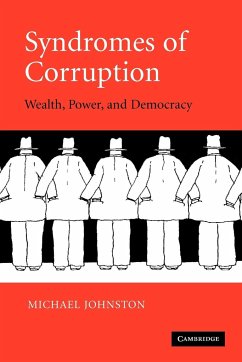Corruption is a threat to democracy and economic development in many societies. It arises in the ways people pursue, use and exchange wealth and power, and in the strength or weakness of the state, political and social institutions that sustain and restrain those processes. Differences in these factors, Michael Johnston argues, give rise to four major syndromes of corruption: Influence Markets, Elite Cartels, Oligarchs and Clans, and Official Moguls. In this 2005 book, Johnston uses statistical measures to identify societies in each group, and case studies to show that the expected syndromes do arise. Countries studied include the United States, Japan and Germany (Influence Markets); Italy, Korea and Botswana (Elite Cartels); Russia, the Philippines and Mexico (Oligarchs and Clans); and China, Kenya, and Indonesia (Offical Moguls). A concluding chapter explores reform, emphasising the ways familiar measures should be applied - or withheld, lest they do harm - with an emphasis upon the value of 'deep democratisation'.
Hinweis: Dieser Artikel kann nur an eine deutsche Lieferadresse ausgeliefert werden.
Hinweis: Dieser Artikel kann nur an eine deutsche Lieferadresse ausgeliefert werden.
'Michael Johnston's book is an important contribution to corruption studies. It promises to push current research and thinking beyond a focus on economic models of corruption to give more serious consideration to political realities. The cases used to illustrate Johnston's four-fold taxonomy are lively and interesting and capture the essence of the situation in each country. The cumulative weight of these cases provides a convincing background for his provocative and thoughtful reform agenda.' Susan Rose-Ackerman, Yale Law School








